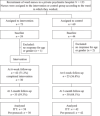Effect of video-based trauma-informed care training for psychiatric nurses: A nonrandomized controlled trial
- PMID: 39816448
- PMCID: PMC11732856
- DOI: 10.1002/pcn5.70052
Effect of video-based trauma-informed care training for psychiatric nurses: A nonrandomized controlled trial
Abstract
Aim: To examine the effect of short-time video-based trauma-informed care (TIC) training in improving attitudes related to TIC and mental health among psychiatric nurses.
Methods: A nonrandomized controlled trial was conducted to investigate the effectiveness of a 60-min TIC training video. The primary outcome measure was the Attitudes Related to Trauma-Informed Care Scale 35 (ARTIC-35). The secondary outcome measures were the TIC Provider Survey, Kessler 6 (K6) scale, the Japanese Burnout Scale, and the Japanese Psychological Safety Scale.
Results: The main analysis included 100 psychiatric nurses (58 in the intervention group and 42 in the control group). The intention-to-treat (ITT) analysis showed that the increase in scores on ARTIC-35 was not statistically significant due to calculating the sample size based on an overestimated effect, but the effect size (ES) was moderate (ES = 0.39) at the 4-6-week follow-up. Although there were no significant differences in the TIC Provider Survey, K6, or Japanese Burnout Scale, a significant effect of the intervention was observed in the Japanese Psychological Safety Scale. A per-protocol analysis, which compared the 30 intervention group participants who had watched all four videos to the control group, showed that the ES (= 0.48) was larger for the ARTIC-35 than for the ITT.
Conclusion: The intervention led to moderate improvement in attitudes related to TIC, psychological safety, and burnout.
Keywords: burnout; mental health; psychological; psychological safety; trauma‐informed care (TIC); video‐based training.
© 2025 The Author(s). Psychiatry and Clinical Neurosciences Reports published by John Wiley & Sons Australia, Ltd on behalf of Japanese Society of Psychiatry and Neurology.
Conflict of interest statement
Risa Kotake, Emiko Otsu, Hiroki Asaoka, Utako Sawada, and Yuki Miyamoto report there are no competing interests to declare. Daisuke Nishi reports personal fees from Startia, Inc., MD.net, and an honorarium from Takeda Pharmaceutical Co., Ltd and Otsuka Medical Devices Co., Ltd outside the submitted work.
Figures
Similar articles
-
Association Between Attitudes Toward Trauma Informed Care and Psychological First-Aid Training Experience Among Health Care Professionals in Japan.Disaster Med Public Health Prep. 2023 Aug 3;17:e443. doi: 10.1017/dmp.2023.103. Disaster Med Public Health Prep. 2023. PMID: 37533366
-
Validation of the Attitudes Related to Trauma-Informed Care Scale (ARTIC).Psychol Trauma. 2021 Jul;13(5):505-513. doi: 10.1037/tra0000989. Epub 2020 Dec 10. Psychol Trauma. 2021. PMID: 33301342
-
A Preliminary Evaluation of the Psychometric Properties of the ARTIC-10 in Dental Settings: A Cross-Sectional Study.Health Sci Rep. 2025 Jun 11;8(6):e70908. doi: 10.1002/hsr2.70908. eCollection 2025 Jun. Health Sci Rep. 2025. PMID: 40510530 Free PMC article.
-
Development, implementation, and evaluation of a trauma-informed simulation-based training program for graduate nurses: A single arm feasibility and pilot study.Nurse Educ Today. 2022 Oct;117:105460. doi: 10.1016/j.nedt.2022.105460. Epub 2022 Jul 14. Nurse Educ Today. 2022. PMID: 35878452 Review.
-
Outcomes of trauma-informed care on the psychological health of women experiencing intimate partner violence: A systematic review and meta-analysis.J Psychiatr Ment Health Nurs. 2024 Apr;31(2):203-214. doi: 10.1111/jpm.12976. Epub 2023 Sep 12. J Psychiatr Ment Health Nurs. 2024. PMID: 37697899
Cited by
-
Effect of video-based trauma-informed care training for nursing staff on seclusion and restraint of psychiatric inpatients: A non-randomized controlled study.Int J Nurs Stud Adv. 2025 Jan 22;8:100297. doi: 10.1016/j.ijnsa.2025.100297. eCollection 2025 Jun. Int J Nurs Stud Adv. 2025. PMID: 39950066 Free PMC article.
References
-
- Kilcommons AM, Morrison AP. Relationships between trauma and psychosis: an exploration of cognitive and dissociative factors. Acta Psychiatr Scand. 2005;112(5):351–359. - PubMed
-
- Reeves E. A synthesis of the literature on trauma‐informed care. Issues Ment Health Nurs. 2015;36(9):698–709. - PubMed
-
- Kuehn BM. Trauma‐informed care may ease patient fear, clinician burnout. JAMA. 2020;323:595. - PubMed
-
- Johnson J, Hall LH, Berzins K, Baker J, Melling K, Thompson C. Mental healthcare staff well‐being and burnout: a narrative review of trends, causes, implications, and recommendations for future interventions. Int J Ment Health Nurs. 2018;27(1):20–32. - PubMed
LinkOut - more resources
Full Text Sources

